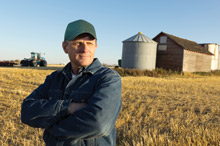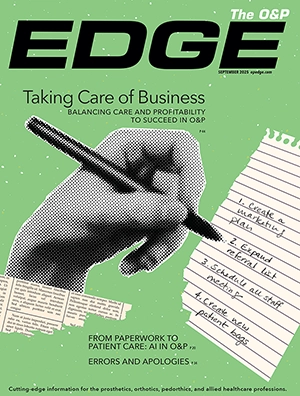
Prosthetic hands, arms, legs, and feet used by agricultural workers with a major limb amputation don’t seem to be durable, affordable, or adaptable enough for their lifestyles, according to a study published online in the journal Disability and Rehabilitation: Assistive Technology.
The study, which claims to be the first to provide detailed information on the limitations facing this amputee population, is part of a larger research project at Northwestern University Prosthetics-Orthotics Center (NUPOC) that aims to design educational materials tailored to the specific needs of farmers and ranchers with amputations and to work with prosthesis manufacturers to develop and reengineer more robust products and components.
“We are also exploring how products created for people with amputations in developing countries may benefit farmers and ranchers here in the U.S.,” said Craig Heckathorne, MSc, a research/design engineer with the NUPOC research staff and second author of the study.
Results of this ongoing research could benefit people with amputations who work in other physically demanding professions such as the military, construction, forestry, commercial fishing, mining, and manufacturing.
“There are [a] lot of issues and challenges to farming with a prosthesis,” said Stefania Fatone, PhD, BPO(Hons), a research associate professor in physical medicine and rehabilitation at NUPOC and corresponding author of the study. “They often need to climb ladders and silos, lift bags of feed and seed, and walk on uneven terrain, in all kinds of weather conditions. Also, a dairy farmer may have very different needs than a corn farmer or cattle rancher.”
Heckathorne and Kathryn Waldera, MS, a research engineer in physical medicine and rehabilitation at NUPOC and lead author of the study, conducted one-on-one interviews with 40 American farmers and ranchers with amputations to gather information about how current and past prostheses were used, prosthetic failures, and their ability to complete farm tasks while using a prosthesis. They also interviewed 26 prosthetists who provide services to farmers and ranchers.
The study found that the common problems farmers and ranchers face revolve around the following points:
-
Durability: Lack of durability and utility was the major theme identified by this study. Farmers report breaking bolts when jumping, lifting or performing other on-the-farm tasks. Many reported using their prosthesis as a tool to carry out work. Farmers’ prostheses seem to deteriorate faster and fail more frequently than those of non-farmers with amputations.
-
Safety: Farmers reported many falls and secondary injuries due to prosthetic use. Researchers found that many safety problems may be related to durability issues.
-
Environment: Weather, dirt, and rough terrain can lead prostheses to break more easily. Farmers reported that prostheses sometimes get stuck in mud, caught in weeds, and exposed to chemicals, rain, snow, and extreme temperatures. All farmers interviewed in this study avoided using myoelectric prostheses while on the job because of the risk of exposure to harsh environments.
-
Adaptation: Many farmers said they chose to use a prosthesis as an adaption to address the challenges of farming after an amputation. Farmers reported having to make additional changes in routines, farm equipment, and in attitude to successfully return to farming after an amputation.
-
Cost: Prostheses are expensive, and farmers and the prosthetists who work with them reported that medical insurance coverage for the devices is often inadequate. Some farmers report having no insurance or high-deductible insurance because they are self-employed or a small business owner. The high cost of the devices may drive some farmers to repair their own prosthesis or go without a replacement, which could affect durability and safety. Some farmers in rural areas have to travel great distances to get to a prosthetist’s clinic, which also adds to costs.
-
Education: Prosthetists are not typically trained about the needs and lifestyles of farmers and ranchers and may prescribe inappropriate prosthetic choices. Some farmers indicated that they were not consistently educated and trained on the operation of their device. However, some prosthetists reported that farmers had unrealistic expectations of their prosthesis.
These findings have provided a framework for a larger study on this issue, the researchers said. They are currently recruiting farmers and ranchers with amputations from across the United States to participate.
Editor’s note: This story has been adapted from materials provided by Northwestern University.



